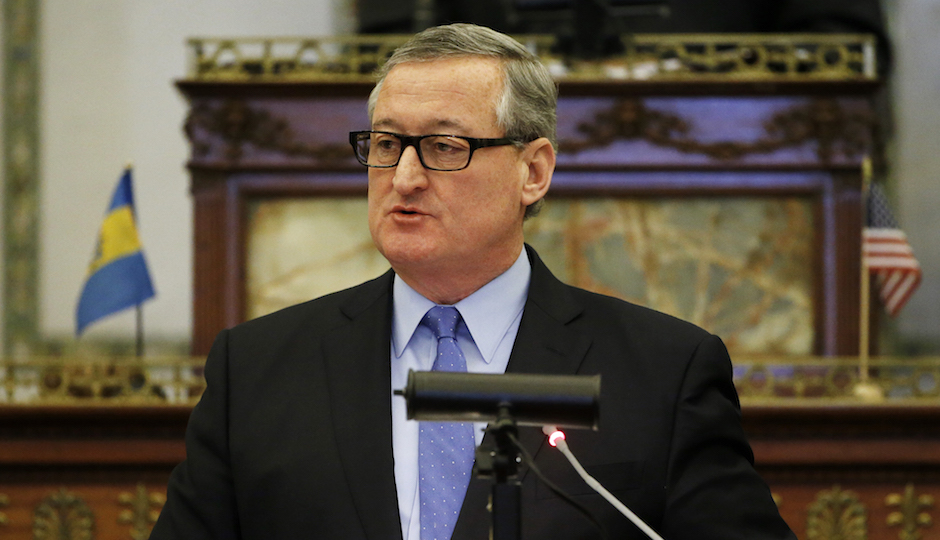The Chamber of Commerce Isn’t Attacking Kenney’s Soda Tax — That’s Huge

Mayor Jim Kenney delivers his budget address at City Hall. | Photo by Matt Rourke/AP
Mayor Jim Kenney delivered his first budget address Thursday, in which he argued that City Council should pass a soda tax in order to expand pre-K, overhaul parks, create jobs, and more.
“The most persuasive argument of all for the tax is that Philadelphians elected us to implement the very programs this revenue will fund,” he said. “And I know that one tax can make some very wealthy and very powerful people very, very upset, but I’ve seen this Council take on special interests before, and I know, together, we can do it again.”
Kenney’s speech was passionate, detailed and, at points, inspired audience members to energetically burst into applause. But some of the most intriguing things about Kenney’s budget address took place offstage, like when the Greater Philadelphia Chamber of Commerce opted not to attack his proposed three-cents-per-ounce soda tax. Here are five takeaways from the event:
- Kenney attempted to poke a hole in many of the soda industry’s main arguments against the sugary beverages tax. He said that “there is simply nowhere else” find the revenue to pay for expanded pre-K and other programs. Just as importantly, he said, the soda industry’s opposition to the tax is unfounded. Big Soda says the tax would hurt poor Philadelphians. Kenney said that, in truth, “soda companies are the ones actually targeting their advertising at low-income, minority communities.” Big Soda says the tax would kill jobs. But Kenney argued that business didn’t slow down when Council created a liquor tax years ago. “In fact,” he said, “Philadelphia’s restaurant and bar scene has grown.” Big Soda says the tax would hurt small businesses. But, Kenney insisted, “small grocers, bodegas and convenience stores are already stocking and selling non-sugary beverages.”
- Kenney heaped praise onto City Council members. Kenney is hoping to have a much more productive relationship with lawmakers than former Mayor Michael Nutter did — and he’ll need it if he wants to push the soda tax through. During his speech, he referenced each Council member by name, lauding the work they’ve done on everything from municipal IDs to police body cameras to Vision Zero. “Councilman Greenlee has been a consistent advocate for the rights of Philadelphians, both through paid sick leave and battling wage theft,” he said. “Councilwoman Reynolds-Brown was among the first to educate me on the importance of affordable, quality, pre-K.” And on and on.
- No one staged an anti-soda tax protest at Kenney’s speech. Earlier this week, the Teamsters issued a scathing statement about Kenney’s proposed soda tax. They called it “patently unfair” and “illegal,” and predicted that it would “result in the swift departure of the Pepsi and Coca-Cola operations in the city.” Yet the Teamsters did not stage a protest against Kenney’s proposal Thursday. They didn’t even pack City Hall with union members holding anti-soda tax signs. Is this a signal that the Teamsters won’t fight as fiercely against Kenney’s proposed soda tax as they fought against Nutter’s? Only time will tell. But what’s certain is that the new mayor has a lot of goodwill going his way. In fact, audience members actually applauded when Kenney first said the words “tax on sugary drink distributors.”
- The Greater Philadelphia Chamber of Commerce is not attacking the soda tax. That’s a big deal. During Kenneys’ speech, the chamber released a statement about the mayor’s proposed budget. It praised his plans to expand pre-K, reduce business taxes, and invest in parks and rec centers. “As one business leader noted this week, Philadelphia has the opportunity to implement a policy that can grow jobs and businesses, attract and retain talented workers, and help public education,” the group said. “The Greater Philadelphia Chamber of Commerce agrees, and strongly supports the mayor’s proposal to expand access to quality pre-K education.” But the chamber didn’t say a word about how Kenney is planning to pay for the pre-K program, which is remarkable. Many will see that as an implicit endorsement of the tax. Critics of the soda tax would argue that the chamber isn’t talking about the levy because it would be less harmful to their members than other potential revenue generators, such as property or business tax hikes.
- Kenney’s best moments came when he went off-script. He should do that more often. At times, Kenney read his speech too quickly and without enough emotion. When he spoke off the cuff, he was much more effective. During the last few minutes of his budget address, Kenney told an impromptu story that made audience members laugh and cheer several times. It went like this: Kenney recently visited a pre-K program in West Philadelphia, where he talked to two four-year-old boys. It was a engaging, cheerful place. One of the boys told him, “Man, you got a big nose!” A couple days later, Kenney visited Pennypack House School, a school for juveniles housed inside a city prison. Kenney talked to those students, too. “A young man said to me … ‘this is the best school I’ve ever attended.’ The best school he ever attended — in jail,” Kenney said, tearing up. “It is our responsibility to those two four-year-old little boys, to every four-year-old little boy and girl in this city, to not let them go on the road to Pennypack.” Then, the audience gave him a standing ovation.